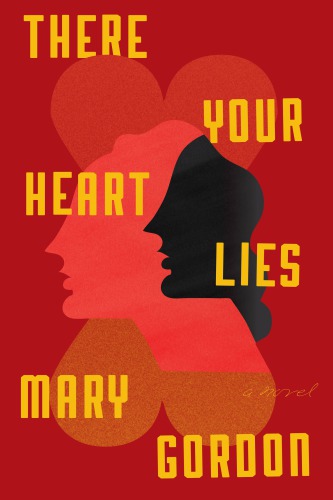
There Your Heart Lies
A Novel
کتاب های مرتبط
- اطلاعات
- نقد و بررسی
- دیدگاه کاربران
نقد و بررسی

March 20, 2017
In 1937, Marian Rabinowitz (née Taylor) is 19 years old and newly married—in name only—to a Jewish doctor who had been her brother’s lover. She has left behind Vassar and her bitter, Catholic Park Avenue family and is on her way to Spain with her husband to tend to the wounded fighting against Franco. Their marriage is a ticket out of Dodge for Marian and a respectable cover for Russell, and Marian in particular is giddy with the possibilities she hopes her courageous new life will allow. Her idealism, however, doesn’t last long. Working in hospitals, she quickly comes to face the grim reality of both war and the limitations of her own circumstances. In this commendable new novel, Gordon (The Liar’s Wife) presents Marian both at the beginning of her adult life and at the end, a woman in her 90s, living in Rhode Island with her 20-something granddaughter Naomi, who knows nothing of her grandma’s earlier escapades until, not quite on her deathbed, Marian begins to tell the story of how, after her first husband left Spain, she fell in love with a Spanish doctor who died suddenly. Marian went on to spend 12 years in Spain, finding both despair and resilience. Marian’s story eventually compels Naomi to begin an adventure of her own, hoping to understand more of the loss and renewal that shaped her grandmother. While much of the novel relies on heavy exposition and a structure that feels somewhat artificial, Marian is a delightful, absorbing character, illuminating both a period and a place.

Starred review from March 1, 2017
Shifting points in time and points of view reveal a young woman shaped by the zealotry that can emanate from family, faith, or war.In the late 1930s, Marian Taylor breaks with her wealthy New York family after their righteous Roman Catholic persecution forces her beloved gay brother to hang himself. She sails off to Spain with his lover, Russell, a medical doctor she has married for mutual convenience, to join the forces fighting Franco by caring for the wounded. She is 19 and uncommonly naive, prey to "the vague ideas of a privileged girl," while her new friends, who are fiercely debating fascism and communism, "are the most wonderful people in the world." Gordon (The Liar's Wife, 2014, etc.) writes from within the character's fledgling sensibility to provide a baseline for innocence soon to be broken, as is the narrative. The chapters on Spain alternate with others in which Marian is 92 and living on Rhode Island's coast with her granddaughter, Amelia. Back in Spain, Marian loses Russell as he flees the war's horrors and returns to the U.S. She marries a Spanish doctor and soon loses him to sepsis. She has their baby and loses him to her domineering mother-in-law. Gordon touches often on the sadism of soldiers, clerics, and citizens under Franco, encapsulating it in a devastated priest, Father Tomas, emerging from a confessional after three hours of listening to--and perforce absolving--penitents and their litanies of cruelty. The narrative lightens considerably with the shifts to older Marian in 2009 as she gives Amelia an elderly woman's perspective on that terrible time in Spain--before Gordon sends the younger woman off on her own little crusade, a nice parallel without much point. An emotionally and historically rich work with a strong character portrait holding together its disparate parts.
COPYRIGHT(2017) Kirkus Reviews, ALL RIGHTS RESERVED.

December 1, 2016
In her nineties, Marian is living comfortably with granddaughter Amelia in a Rhode Island cottage. But a cancer diagnosis compels her to reveal experiences during the Spanish Civil War she's kept hidden, especially as she cut herself off from her rich, conservative Irish Catholic family, which disapproved of her volunteering. Amelia is inspired to travel to Spain, seeking both closure for Marian and a direction for herself. Big promotion.
Copyright 2016 Library Journal, LLC Used with permission.

February 15, 2017
Who are you? Who am I? Those are the questions that echo throughout Gordon's (Final Payments; Pearl) latest novel. In 1937, Marian enters into a marriage of convenience with Russell, her late brother's lover, and goes with him to Spain, where he works as a doctor in support of the Republicans opposing Franco's Fascist regime. Both Marian and Russell are horrified and disillusioned by the infighting between the communists and anarchists, and by the atrocities committed on all sides of the struggle. In 2009, Marian's granddaughter, Amelia, stays with Marian while she tries to find direction, and eventually hears the stories of Marian's turbulent past. While this novel's structure of building a narrative across alternating timeframes is common in contemporary fiction, an unusual element here is that we sometimes get the same events depicted twice: first through the third person, and then through Marian telling her story to Amelia. This way, we see Marian's attempts to attach meaning and significance to particular events, and Amelia's disinterest or boredom with parts of the story, as well as her interpretations of her grandmother's meaning. VERDICT As Amelia explores her grandmother's story in this sharply observed text, her misguided attempt to bring closure flirts with, but thankfully doesn't succumb to, a Hollywood ending. All Gordon fans will appreciate. [See Prepub Alert, 11/7/16.]--Christine DeZelar-Tiedman, Univ. of Minnesota Libs., Minneapolis
Copyright 2017 Library Journal, LLC Used with permission.

























دیدگاه کاربران